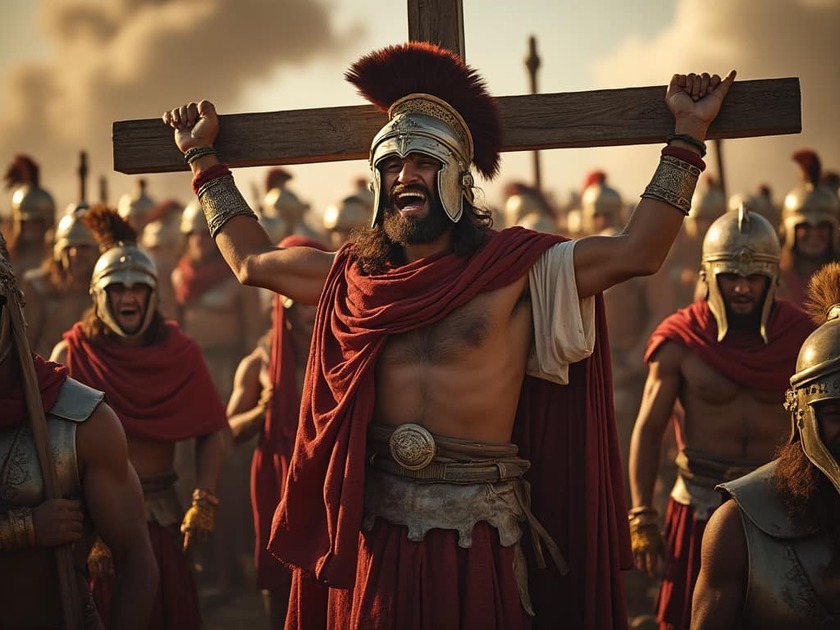Matthew 27:27-31
"Then the governor’s soldiers took Jesus into the governor’s residence and gathered the whole company around him. They stripped him and dressed him in a scarlet robe. They twisted together a crown of thorns, put it on his head, and placed a staff in his right hand. And they knelt down before him and mocked him: “Hail, king of the Jews!” Then they spat on him, took the staff, and kept hitting him on the head. After they had mocked him, they stripped him of the robe, put his own clothes on him, and led him away to crucify him."
As "the church", the central thing that we should be looking for from the gospel scriptures should be how and why Jesus did and said the things he did in order to fulfill his promise to build his "church" that would withstand even the gates of hell. The focus of the trial before Pilate is whether or not Jesus is the king of the Jews. Jesus confirms that he is (v.11) and is subsequently chastised and condemned to death by the Romans. Jesus submits to this mocking and demeaning death. He takes on his kingly crown of thorns and his throne is his cross. He submits to all these things in order to give his life for his people, The Church. Jesus ignored their mocking, he refused to yield to their mocking temptations, and instead he chose to fulfill his divine Sonship by perfect obedience to the will of his Father.
"Suddenly, the curtain of the sanctuary was torn in two from top to bottom, the earth quaked..."
And the mocking stopped.
The verdict for Jesus was death. The sentence was crucifixion. And as it turns out, the only ones who were truly condemned were the ones who condemned and mocked The King of the Jews. But that all gets sorted out later on.
Matthew 27:54
"When the centurion and those with him, who were keeping watch over Jesus, saw the earthquake and the things that had happened, they were terrified and said, “Truly this man was the Son of God!”"
Around the year 100 A.D. the Jews, both palestinian and the diaspora (the Jews living outside Israel), were continuing to be a challenge for their Roman rulers. The "Jewish" world in which Jesus and his church were founded was quite a bit different than the rest of the Roman world. And therefore, special distinctions and dispensations became necessary for the Romans in order to deal with the influence of these Jewish people. They would allow local communities to live in their own ways and customs as long as the Romans received the temple taxation they wanted. But they also insisted that the nations they conquered and occupied should include their Roman gods to whatever gods the locals worshipped. But the problem with the Jews was they were unbending in their monotheistic beliefs and practices. So special exemptions were established for them. And this meant that from to time certain fanatics might come along that would need special "treatment". Jesus and his church were seen as such. They were seen as a fanatical Jewish sect.
As the Christian gospel spread throughout the empire, this little fanatical Jewish sect became something much more significant. Christians eventually became a very significant thorn in the side of the Roman emperors. And as time went on, through the gates of hell, the gospel began to take hold of the Roman people. And the emperors weren't exempt from the gospels influence.
Eventually the Roman government found it necessary to make concessions. The Romans weren't granting the early Christian churches absolute freedom, they just simply tolerated them, in a cautious sort of way. At some points in those first few hundred years of development, the Christian churches suffered greatly from persecution being considered by the Roman rule as "unlawful superstition". And yet, they did eventually obtain citizenship in the empire under the edict of Galerius, issued in 311. But still this was merely a tolerance of them, not an establishment of their right to exist. Religious freedom came later under Emperor Constantine in 313. And that quickly established the Church throughout the entire Roman culture.
Once this freedom was established as Roman law, things changed very quickly. Legislation discriminating against Christians was removed. The Church was able to recover places of worship and other properties previously confiscated during the persecutions. Immoral pagan practices, especially those involving the shedding of blood were declared illegal. And probably most significant was the cultural shift that came about after the freedom to teach the gospel was established. The moral principles of the gospel began to provide the inspiration behind many new civil legislations. It was the beginning of the Christian-Roman law.
One significant example of this cultural shift was the removal of the statues of the Roman goddess of victory from the Roman Senate chambers. This goddess symbolized Romes's right to rule. She was a very popular military goddess which I find ironic when you think back to that cross and those mocking soldiers. Her graven cultic images show her as a winged woman stepping on and supported by a globe, and she's holding a wreath or a palm-branch, symbolizing triumph over all the earth. And now the Christian cross is about to defeat her.
In 382 A.D., Christian emperor Gratian refused the post of pontifex maximus, and abolished Rome's traditional deities and rites. Gratian had Victoria's altar removed from her temple and resistance faded in time. The pagan gods were on the verge of elimination in The Roman Empire. It was the beginning of the end for them. The gates of hell had finally been faced and overcome. This religious evolution reached its final stage when Emperor Theodosius I established the edict on 28 February 380 A.D. ordering all people of the empire to adopt catholic Christianity. The fanatical Christian traditions have now become "state religion", and that's a whole new ball of wax.
And that's for another day.
But for today's exploration into God's Word, it's interesting to note how His word, His gospel, is able to transform nations when the people, The Church, fulfills its purpose.
Matthew 28:19-20
"Therefore, go and make disciples of all nations, baptizing them in the name of the Father and of the Son and of the Holy Spirit, and teaching them to obey everything I have commanded you. And surely I am with you always, to the very end of the age."
Those mocking soldiers at the cross had no idea what they were starting when they crowned Jesus as king.
#JesusIsKing




















